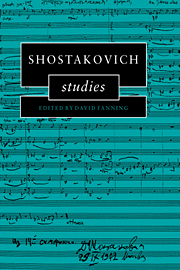Book contents
- Frontmatter
- Contents
- Acknowledgments
- 1 Introduction. Talking about eggs: musicology and Shostakovich
- 2 Public lies and unspeakable truth interpreting Shostakovich's Fifth Symphony
- 3 Form in Shostakovich's instrumental works
- 4 Russian theorists on modality in Shostakovich's music
- 5 The cycle of structure and the cycle of meaning: the Piano Trio in E minor, Op. 67
- 6 Leitmotif in Lady Macbeth
- 7 From Lady Macbeth to Katerina Shostakovich's versions and revisions
- 8 The Golden Age: the true story of the première
- 9 ‘And art made tongue-tied by authority’ Shostakovich's song-cycles
- 10 A debt repaid? Some observations on Shostakovich and his late-period recognition of Britten
- 11 Shostakovich and Schnittke: the erosion of symphonic syntax
- Index
1 - Introduction. Talking about eggs: musicology and Shostakovich
Published online by Cambridge University Press: 22 October 2009
- Frontmatter
- Contents
- Acknowledgments
- 1 Introduction. Talking about eggs: musicology and Shostakovich
- 2 Public lies and unspeakable truth interpreting Shostakovich's Fifth Symphony
- 3 Form in Shostakovich's instrumental works
- 4 Russian theorists on modality in Shostakovich's music
- 5 The cycle of structure and the cycle of meaning: the Piano Trio in E minor, Op. 67
- 6 Leitmotif in Lady Macbeth
- 7 From Lady Macbeth to Katerina Shostakovich's versions and revisions
- 8 The Golden Age: the true story of the première
- 9 ‘And art made tongue-tied by authority’ Shostakovich's song-cycles
- 10 A debt repaid? Some observations on Shostakovich and his late-period recognition of Britten
- 11 Shostakovich and Schnittke: the erosion of symphonic syntax
- Index
Summary
What is a musicologist? Shostakovich offered his definition over breakfast: ‘What's a musicologist? I'll tell you. Our cook, Pasha, prepared the scrambled eggs for us and we are eating them. Now imagine a person who did not cook the eggs and does not eat them, but talks about them – that is a musicologist.’ No doubt many would agree. Yet it should not be forgotten that among Shostakovich's closest friends and confidants was Ivan Sollertinsky – man of many parts, but primarily a musicologist – who probably did more than any other individual to shape Shostakovich's tastes and sharpen his intellect in his formative years; and his most extensive and revealing correspondence after Sollertinsky's death in 1944 was with Isaak Glikman, who, as a theatre historian, must count as another professional egg-talker. There are even occasional words of praise for musicologists to be found in Shostakovich's writings, the most apparently sincere of them reserved for Lev (now Leo) Mazel’, whose work on Shostakovich draws tribute from two contributors to the present volume.
But on the whole it remains true that Shostakovich had a low opinion of musicologists, not just because of their seemingly redundant and parasitical sphere of activity, but also because of the cowardice, even malice, he detected in some of them (above all in the doyen of Soviet musicology, Boris Asaf'yev). Maybe, then, he would have been happy to know that musicologists outside the former Soviet Union have tended to shy away from his music: and maybe he would have looked with intense suspicion at the line-up of musicologists in this volume of Shostakovich Studies.
- Type
- Chapter
- Information
- Shostakovich Studies , pp. 1 - 16Publisher: Cambridge University PressPrint publication year: 1995
- 3
- Cited by

